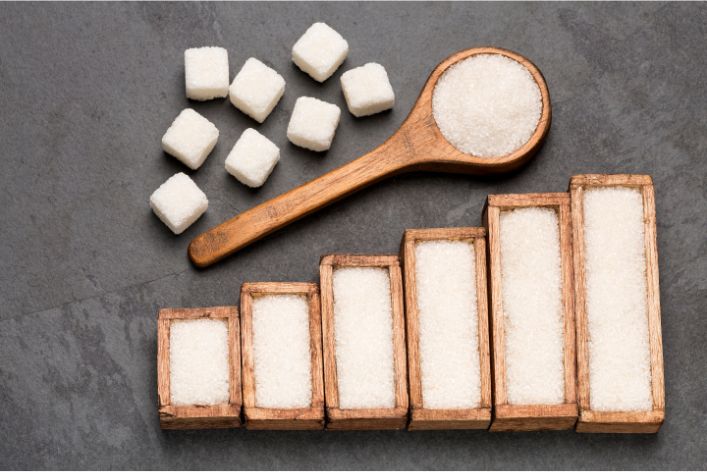Sugar – it’s in many foods we consume daily. But how does sugar consumption impact your health? Let’s delve into it.
Excessive sugar intake is linked to several health issues. It’s crucial to understand its effects to protect our well-being. It’s not about eliminating sugar completely but consuming it mindfully.
In this article, we’ll explore sugar’s impact on health. We’ll discuss sugar’s role in obesity, diabetes, heart disease, and dental health. We’ll also cover the difference between natural and added sugars, and provide practical tips for reducing sugar intake.

This topic is critical because many are unaware of sugar’s hidden presence in their diet. It’s in sauces, drinks, cereals, and even ‘healthy’ snacks. Being mindful of your sugar consumption can significantly influence your health.
So, ready to navigate the sweet world of sugar with a new perspective? Join us as we uncover the bitter truth about sugar and its impact on your health.
Remember, knowledge is power. And in this case, it’s also the key to healthier dietary choices. Let’s get started!
Read: Can Owning a Pet Improve Your Health and Well-being?
What is Sugar?
Sugar is a type of carbohydrate found in many foods, including fruits, vegetables, milk, and grains. It is a primary source of energy for the body. However, the type of sugar that is commonly referred to is the refined sugar. This sugar is extracted from sugarcane or sugar beets.
There are different types of sugar, including glucose, fructose, and sucrose. Glucose is the primary source of energy for the body’s cells. Fructose is found in fruits and is the sweetest natural sugar. Sucrose comes from sugarcane and sugar beets, and it’s commonly used to sweeten foods and drinks.
When sugar is consumed, it’s broken down into glucose in the small intestine. Glucose then enters the bloodstream and travels to the cells, where it’s used to provide energy. However, excess sugar intake can lead to health problems.
How sugar is processed in the body
Processed sugar is linked to type 2 diabetes and obesity because it causes a spike in blood sugar levels. Over time, this can lead to insulin resistance, a condition where the body can’t use insulin properly to regulate blood sugar levels.
In addition to type 2 diabetes and obesity, excessive sugar intake can also lead to other health problems. For example, sugar can increase the risk of heart disease, cancer, and liver disease. Regular consumption of sugary drinks can also cause tooth decay and cavities.
Reducing sugar intake is essential for maintaining good health. One way to do this is to limit the consumption of processed and sugary foods such as candy, soft drinks, and baked goods. Focus on eating natural sugars found in fruits, vegetables, and whole grains.
In addition to reducing sugar intake, it’s also important to exercise regularly. Exercise helps to reduce insulin resistance and improves the body’s ability to use glucose for energy. Additionally, eating a balanced diet is essential for maintaining overall health.
Sugar is a type of carbohydrate that provides energy for the body. However, excessive sugar intake can lead to health problems such as type 2 diabetes, obesity, heart disease, and cancer. Reducing sugar intake by limiting the consumption of processed and sugary foods and increasing exercise is essential for maintaining good health.
Innovative Tech Solutions, Tailored for You
Our leading tech firm crafts custom software, web & mobile apps, designed with your unique needs in mind. Elevate your business with cutting-edge solutions no one else can offer.
Start NowRead: The Benefits of Apple Cider Vinegar for Digestion and Blood Sugar
How does Sugar Consumption affect your Health?
Sugar is a beloved ingredient among people, but its effects on health are significant. Its consumption can impact weight gain, obesity, type 2 diabetes, heart health, and oral health. Understand the impact of sugar on your body and make informed decisions about sugar consumption.
The impact of sugar on weight gain and obesity
- Sugar contains empty calories that do not provide nutrition to the body.
- Excessive sugar consumption leads to weight gain and obesity.
- The body converts excess sugar into fat, which accumulates in different body parts.
- Sugar increases cravings and unhealthy snacking, leading to overeating and further weight gain.
The link between sugar and type 2 diabetes
- Consuming sugar increases blood sugar levels, raising the risk of type 2 diabetes.
- The pancreas releases insulin to manage blood sugar levels, but excessive sugar leads to insulin resistance.
- Insulin resistance hinders the body’s ability to regulate blood sugar, leading to type 2 diabetes.
- Reducing sugar intake can reduce the risk of developing type 2 diabetes.
The effect of sugar on heart health
- Excessive sugar consumption leads to the accumulation of fat in the liver.
- The accumulation of fat in the liver can cause heart diseases, such as heart attack and stroke.
- Sugar increases inflammation in the body, leading to cardiovascular diseases.
- Reducing sugar intake can promote heart health and lower the risk of heart diseases.
The impact of sugar on tooth decay and oral health
- The mouth contains bacteria that feed on sugar, leading to the production of acid that erodes tooth enamel.
- Excessive sugar consumption can lead to cavities and tooth decay.
- Sugar also causes gum inflammation, leading to gingivitis and other periodontal diseases.
- Reducing sugar intake and practicing good oral hygiene can promote oral health.
Sugar consumption can significantly impact one’s health. It can lead to weight gain, obesity, type 2 diabetes, heart diseases, and oral health problems. Reducing sugar intake can promote better health outcomes.
Proper education and awareness about the effects of sugar on the body can help individuals make informed decisions about their diet and sugar consumption. Always remember, too much of anything is never good for the body.
Read: Should You Switch to a Plant-Based Diet for Health Benefits?
Hidden Sources of Sugar
Sugar is a commonly consumed substance, but not everyone is aware of the hidden sources of sugar in their daily lives. In this blog post, we will discuss the presence of sugar in common foods and drinks, the importance of reading food labels, and provide tips for reducing sugar intake.
The presence of sugar in common foods and drinks
- Yogurt – flavored yogurts can contain up to 15 grams of sugar per serving
- Granola bars – some granola bars can have as much as 8 grams of sugar
- Soda – a 12 oz can of soda can contain up to 39 grams of sugar
- Condiments – ketchup, BBQ sauce, and salad dressing can contain up to 4 grams of sugar per tablespoon
These are just a few examples of common foods and drinks that can be high in sugar. It’s important to be aware of these hidden sources of sugar in order to reduce your overall intake.
The importance of reading food labels
Reading food labels is an essential part of reducing your sugar intake. Look for hidden sources of sugar such as:
- Fructose
- Corn syrup
- Sucrose
- Dextrose
These are all names for sugar and can be found in many processed foods.
Tips for reducing sugar intake
Reducing your sugar intake can be difficult, but here are some tips to get you started:
- Replace sugary snacks with fruit or nuts
- Drink water or unsweetened tea instead of soda or juice
- Choose plain yogurt instead of flavored and add your own fruit for flavoring
- Read food labels and avoid foods with added sugars
- Cut back gradually to avoid feeling deprived
Remember, reducing your sugar intake can help improve your overall health and reduce the risk of developing chronic diseases such as diabetes, heart disease, and obesity. By being aware of hidden sources of sugar and making small changes, you can reduce your sugar intake and improve your health.
Read: Unleash Tea’s Healing Magic: Transform Health with Potent Brews

How to Reduce Sugar Intake
Substitutes for sugar
- Stevia: a natural sweetener that has zero calories and does not affect blood sugar levels.
- Honey: a natural sweetener that contains antioxidants and has a lower glycemic index than table sugar.
- Agave: a natural sweetener that is low on the glycemic index and contains fructose.
- Maple Syrup: a natural sweetener that contains minerals and antioxidants and has a lower glycemic index than table sugar.
Tips for reducing cravings for sugar
- Drink more water: dehydration can sometimes manifest as a sugar craving.
- Get enough sleep: lack of sleep can increase cravings and decrease willpower.
- Reduce stress: stress can lead to emotional eating and sugar cravings.
- Exercise regularly: exercise can help reduce cravings and improve overall health.
Healthier eating options and lifestyle changes
- Eat a balanced diet: including fruits, vegetables, lean proteins, and whole grains.
- Plan meals and snacks ahead of time: this can help avoid impulse buys and unhealthy choices.
- Avoid processed foods: these often contain added sugars and can increase cravings.
- Read food labels: look for added sugars and avoid products with high sugar content.
- Practice mindful eating: be present while eating and focus on the enjoyment of food without distractions.
- Limit alcohol consumption: alcohol can contribute to excess sugar intake.
- Get support: find a friend or mentor who can support you in your efforts to reduce sugar intake.
Reducing sugar intake can be challenging, but it is important for overall health. Substituting sugar with natural sweeteners, reducing cravings with lifestyle changes, and making healthier eating choices can make a significant impact. It’s never too late to start making changes, so start small and focus on progress, not perfection.
Read: The Top 10 Superfoods You Need to Include in Your Diet
Conclusion
After looking at various aspects of the impact of sugar consumption on health, it is evident that excessive intake of it can lead to numerous health problems.
The consumption of added sugar is the primary cause of obesity, type 2 diabetes, and heart diseases. Fructose, a type of sugar, is especially harmful and can cause non-alcoholic fatty liver disease and metabolic syndrome.
Moreover, sugar consumption can lead to addiction and withdrawal symptoms, making it difficult to limit the intake of sugar. Eating whole fruits, avoiding processed foods, and reducing the intake of sugar-sweetened beverages can help fight sugar addiction and associated health problems.
It is essential to understand that sugar, like any other food, should be consumed in moderation. While it adds taste to our food, we must not overlook its impact on our health. It is advisable to keep a check on the sugar intake and make healthy choices while selecting food items.
On a final note, it is crucial to develop a balanced and healthy diet that includes a minimal amount of added sugar to maintain overall health and well-being.
Read: How to Lower Your Blood Pressure Naturally
Before You Go…
Hey, thank you for reading this blog to the end. I hope it was helpful. Let me tell you a little bit about Nicholas Idoko Technologies. We help businesses and companies build an online presence by developing web, mobile, desktop, and blockchain applications.
We also help aspiring software developers and programmers learn the skills they need to have a successful career. Take your first step to becoming a programming boss by joining our Learn To Code academy today!
Be sure to contact us if you need more information or have any questions! We are readily available.










